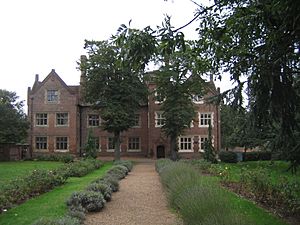Eastbury Manor House facts for kids
Quick facts for kids Eastbury Manor House |
|
|---|---|

Front view
|
|
| Type | Manor House |
| Location | Eastbury Square, Barking, England |
| OS grid reference | TQ 45709 83804 |
| Area | London Borough of Barking and Dagenham |
| Built | 1570s |
| Architectural style(s) | Elizabethan |
| Governing body | London Borough of Barking and Dagenham |
| Owner | National Trust |
|
Listed Building – Grade I
|
|
| Official name: Eastbury Manor | |
| Designated | 28 May 1954 |
| Reference no. | 1359303 |
| Lua error in Module:Location_map at line 420: attempt to index field 'wikibase' (a nil value). | |
Eastbury Manor House is a very old and important building in Barking, London, England. It's called a Grade I listed building, which means it's super special and protected. This amazing house was built during the Elizabethan period, which was when Queen Elizabeth I was in charge. Before the house was built, the land belonged to a big church called Barking Abbey. Today, the National Trust owns Eastbury Manor House, but the local council, the London Borough of Barking and Dagenham, helps look after it. You can visit this historic house for most of the year!
Contents
History of Eastbury Manor House
Building a New Home
The land where Eastbury Manor House stands today was once part of the Barking Abbey estate. A wealthy merchant named Clement Sisley bought this land in the 1570s. He bought it after the king closed down many monasteries and abbeys, including Barking Abbey.
Clement Sisley then built Eastbury Manor House. It was probably the first building in the area made of brick. The house had fancy glass windows and very tall chimneys. These features showed everyone how rich Clement Sisley was. The glass for the windows likely came from Italy because English glass wasn't very good back then.
When Was It Built?
Experts have studied the wooden roof of the house. They used a method called dendrochronology, which looks at tree rings. This study shows the timber for the roof was cut in 1566. There are also old records that say the year 1572 was carved into the bricks. The year 1573 was found on a lead water spout. These dates tell us when the house was finished.
Old Stories and Legends
There are some interesting old stories about Eastbury Manor House. One story says that the people who planned the Gunpowder Plot met there. This was a famous plot to blow up the Houses of Parliament in 1605. Another story says that Lord Monteagle lived there when he received a letter that helped stop the plot. However, most people think these stories are just legends and not true.
Saving the House
Over time, Eastbury Manor House started to fall apart. By the early 1800s, a large staircase was taken down. In the 1830s, the wooden floors and original fireplaces were removed. By the late 1800s, only one part of the house was still safe to live in.
In 1918, the National Trust bought the house. They worked hard to fix it up and bring it back to life. In 1931, it opened as the Museum of Barking. The London Borough of Barking and Dagenham has been managing the house ever since.
Recent Restoration Work
In 1954, Eastbury Manor House was given Grade I listed status. This means it's one of the most important historic buildings in England. In recent years, the house has had a lot of restoration work done. This work was paid for by grants from the Heritage Lottery Fund. The latest part of this restoration finished in 2010. It included a new exhibition that tells the story of the house and its past owners.
 | George Robert Carruthers |
 | Patricia Bath |
 | Jan Ernst Matzeliger |
 | Alexander Miles |

